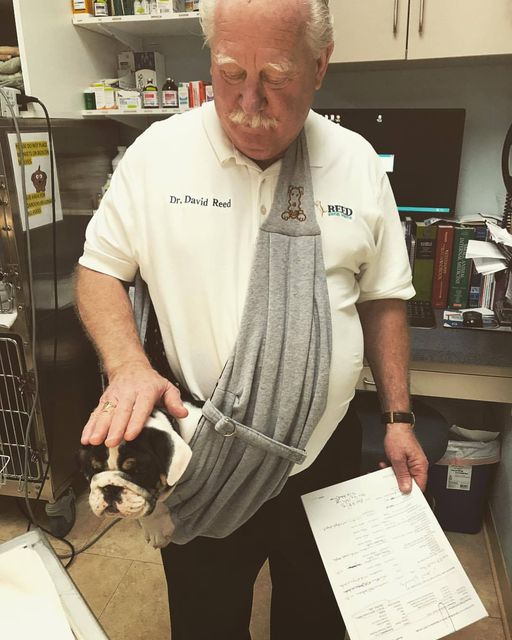Bacterial Skin Infection Treatment in Campbell & Saratoga, CA
Address Skin Bacteria Right Away with Reed Animal Hospital
Skin infections, or pyoderma, in dogs are incredibly common. Often resulting from a bite or scrape, this condition can quickly become uncomfortable for your pet. Reed Animal Hospital is here to help. In most cases, a bacterial skin infection treatment is quick and easy, and your dog can be home later the same day. You should always act rapidly when you notice signs of a skin infection. If you live in the San Jose, Saratoga, or Campbell, CA areas, don’t hesitate to stop by Reed Animal Hospital.
Be on the Lookout for These Symptoms
It is important to identify the key symptoms of common bacterial skin infections. Signs of infection can range from slight skin irritation to a large loss of hair. The team at Reed Animal Hospital suggests taking note of the following symptoms and reporting them to your veterinarian:
Red, itchy, or crusted skin
Lesions or pustules
Discharge in the affected area
Hair loss
Hair standing on end
Swelling
What Causes Skin Infection?
The best way to avoid a skin infection in your dog is to understand the cause. Often, pyoderma begins with a wound, bite, or irritation that a dog continuously scratches. As the injury worsens, it opens up and increases the possibility of a bacterial skin infection. Pyoderma is common in nearly all dog breeds, but those with skin folds such as bulldogs and Boston terriers may be at increased risk for infections. Other potential causes of skin infection might include:
Flea infection
Allergic reaction
Dermatitis
Poor grooming
Cushing’s disease

Receiving a Professional Diagnosis
If you’ve noticed one of the causes or symptoms of a bacterial or viral skin infection in your dog, you should seek a professional diagnosis. Diagnostic tests are minimally invasive and quick. Depending on the symptoms, Reed Animal Hospital might run a few different tests to help our diagnosis so we can make the best recommendation for treatment. Our team always checks for additional underlying conditions that might be causing a skin infection and making it worse. Catching problems early is always the best way to secure your pet’s health!
Suggesting the Best Treatments for Your Dog
Once our team has identified the cause of your dog’s bacterial skin infection, we will prescribe a treatment. Each treatment can be different depending on how your dog contracted the skin infection, its severity, and your dog’s health. In most cases, a topical skin medication, antibiotic, or antifungal ointment will be prescribed. We will provide a consultation on how to administer the medication, and the length of time to administer it. Possible Pyoderma treatments are:
Special shampoos or sprays
A specified number of baths per week
Medications to address an underlying cause, such as Cushing’s disease
Medications for food allergies
Changes in diet

Blood Allergy Testing at Reed Animal Hospital
Our team is also trained to provide blood allergy tests at our clinic. These tests are quick and easy and check for a wide range of allergens. Using this test, we can determine if your pet is allergic to certain foods, dust, mold, and an array of other potential allergens. In many cases, allergies can be treated with an antigen. You can administer antigens at home, giving your pet several doses over a period of time. Nearly 80 percent of pets respond well to antigens, building up a tolerance to whatever allergen was giving them trouble.
Preventing Future Skin Infections in Dogs
It is best to prevent a bacterial skin infection before it occurs. Reed Animal Hospital provides pet owners with suggestions for prevention and proactive prevention for your dog’s health. Dog owners should be vigilant in their awareness of potential symptoms of skin infections to help maintain their dog’s good health. This includes frequent bathing and cleaning under any folds where infections can grow. Food allergies need to be addressed right away, as these can cause skin irritation that may eventually lead to an infection. Ask our team if any medication, shampoos, or a change in diet can reduce your dog’s risk of a bacterial or viral skin infection.
Contact Our Team for Pyoderma Treatment
Have you noticed signs of a bacterial skin infection in your dog? You might just be concerned and will feel better after a quick checkup. Whatever the case, Reed Animal Hospital is here for you and your pet. We understand pet owners never want to see their pet in pain. We work to provide accurate diagnoses and prompt treatments to have your dog feeling back to normal. Bacterial skin infections can worsen down the road. At the first sign of trouble, reach out to our compassionate staff.
We Treat Your Pet as if They Were Our Own
